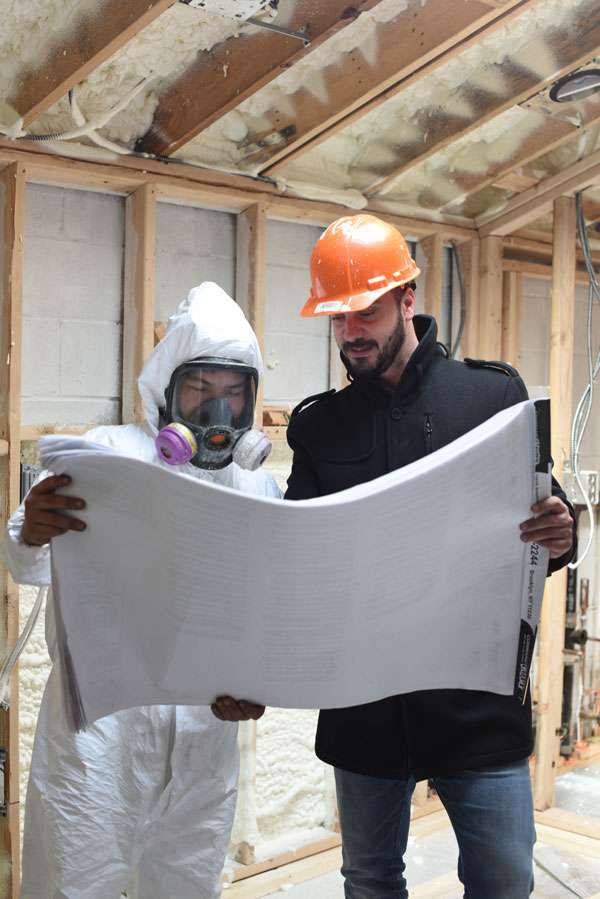















Foam Insulation Solution
Dependable Spray Foam Insulation Service Maspeth Queens, New York
Polyurethane spray foam insulation is a powerful insulative material that offers a smarter approach to insulating your home or business in Maspeth Queens. It’s called spray foam because of the method used for installing it into the walls, ceiling, floors, or crawl space throughout the building. By using a sprayer technicians can distribute the polyurethane into designated area. Once it is spray, the foam insulation expands and completely fills the space it occupies. This creates a tremendous advantage for home and business owners who want a better seal for their building’s interior.
Spray Foam Has a High R-Value
The amount of air or moisture that an insulative material allows through its membrane is known as its R-Value. In most cases, the average R-value of materials such as fiberglass or cellulose is between 2.3 and 3.8 per inch. Foam insulation offers a much higher rating at 5.8-8.0 per inch. This makes it a more efficient option. It creates the ultimate barrier from the outside elements. The result is that you will inhabit a building that has zero drafts and lower humidity. Regardless of the New York or New Jersey weather outside, you can control the temperature of your home or business property inside.
Foam Insulation Solution
New York and New Jersey Building Codes
Before a building can pass an inspection code, it must prove that it will not waste energy. One of the first things that an inspector will audit is how much energy is being used. In order to pass inspection while saving money on utility bills, home and business owners will utilize spray foam insulation to maximize the protection on the inside. Foam insulation will close all the gaps and holes where pests, moisture, drafts, and pollutants can get inside the house. It doesn’t just cover up an opening – it seals it.
Foam Insulation Solution
Spray Foam Makes the Perfect Fire Retardant
In larger structures such as business offices and high rises, extra steps are taken to eliminate the chances of a fire spreading through the entire building. An effective fireproofing method is adding spray applied fireproofing foam that acts as steel beam insulation. Since steel beams provide the greatest amount of support for a tall skyscraper, foam insulation can provide that added reinforcement that they need to be protected from a fire.
Foam Insulation Solution
Sound Proofing Services Available
In addition to wind and moisture elimination, closed-cell spray foam can also drastically reduce the amount of noise that comes in or goes out of a room. Sound waves going through a wall are immediately absorbed by the foam material and stopped dead in their tracks. The result is a reduction in sound by up to 70 decibels. Spray foam is used for sound proofing nurseries, conference rooms, offices, recording studios, and other rooms where the sound is a factor.
Fast Installation & Complete Building Protection
You’ll save money on labor and equipment costs by benefitting from quick and easy installation. Spray foam insulation has the highest R-Value (5.8-8.0 per inch) of any insulation material on the market including fiberglass and cellulose.
Foam Insulation Solution
NY/NJ State Approved & Durability
Foam insulation regularly meets or exceeds all residential and commercial building codes. After you have your spray foam insulation installed your home will be protected for several decades with minimal need for repair or replacement.
Our Clients Testimonials
Linda P.
Satisfied Customer
"My home was freezing, I found out I have no insulation , I called them. They were professional and did a great job."
Aleena H.
Satisfied Customer
"Very honest company with reasonable pricing. Extremely competitive within the current market place. I went with the attic air sealing package to coincide with the blown-in fiberglass, that I was in dire need for because my home was hotter than an oven on sunny days."
David B.
Satisfied Customer
"My home was freezing, I found out I have no insulation , I called them. They were professional and did a great job."
Copyright Foam Insulation Solution 2025 | All Rights Reserved










